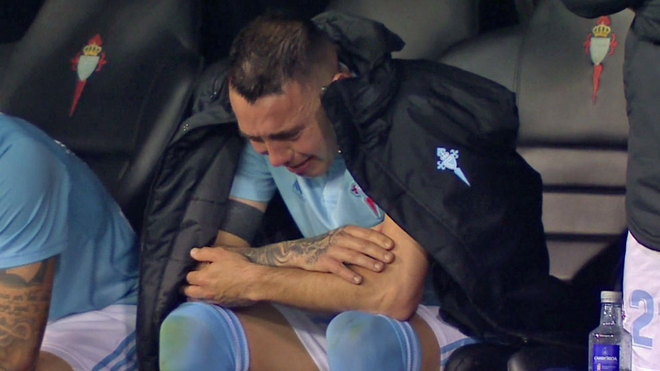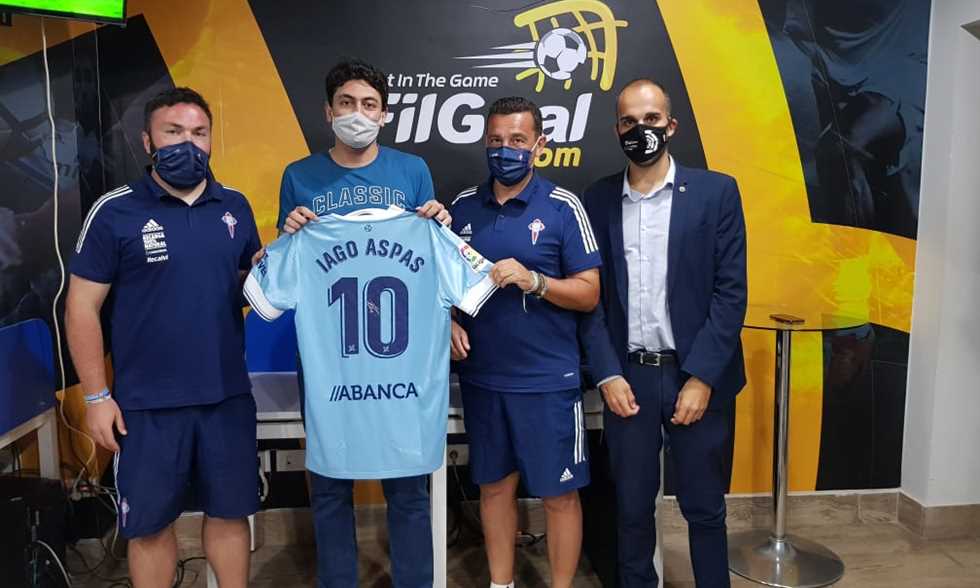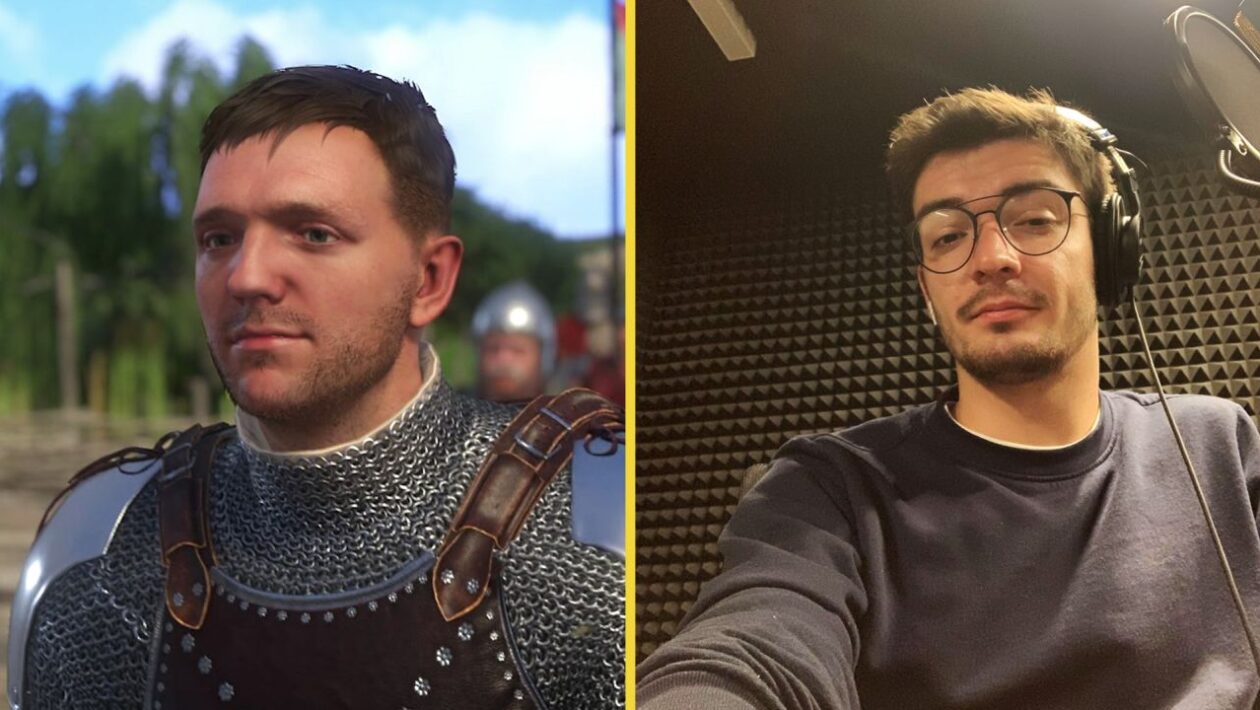Celta Vigo delegation and the Commissioner of the Spanish League, hosted by FilGoal
The International Center for Sports Studies notes that Spanish club Celta Vigo is ranked 15 among the most successful football academies in Europe.
The ranking depends on the number of players being promoted from the club’s academy to play in the five major leagues, and in this regard, Celta has produced 18 players, a number that surpasses other big clubs in Europe.
HQ was fortunate FilGoal.com With a special visit from Marcos Alonso and Diego Garcia Sarabia, coaches in the youth sector of Celta Viejo, during their visit to Egypt to explore talents.
Celta is considered one of the most important football academies in Spain, due to his keen interest in his youth and giving them continuous opportunities in the first team.
Alonso says, laughing at the beginning of his speech: “The problem in Egypt, Spain, and even the whole world, is not with the children we are experiencing, but rather with very nervous parents who expect a new Salah, Messi or Aspas to come out of their hearts.”
Iago Aspas (33 years old) scored 155 goals in 351 matches with the Celta Vigo shirt, which is the symbol of the current generation .. His mention was not a coincidence, but Celta fans consider him the national hero.
Diego gets involved in the conversation and explains: “Parents all the time ask for excuses for their kids failing exams, telling me: ‘You weren’t looking when my two sons did a wonderful trick.”
“In the end, they are human beings, and there is nothing wrong with giving them some justifications.”
Returning to Celta, how can a club, with a small budget, occupy an advanced position at the level of world football academies?
“This is the result of the work of many people over many years,” Marcus Alonso says.
He continues: “About 13 years ago, the club decided that the future lies in (Alcantira).”
“Cantera” is a term in the Spanish language, which is the place of talent extraction referred to as the youth sector.
In fact, “Canterano” or “Academy graduate” was the word most frequently used in Marcos Alonso and Diego Garcia’s mouth.
Alonso continues: “We have 12 or 13 Canterranos in the first team, and in Spain, unlike Athletic Bilbao, which has its own philosophy, we will not see a team that relies on its academy more than Celta Vigo, and this is enormous pride for us.”
While visiting Cairo, the Celta Vigo duo got to meet a very dear person: Ahmed Hossam Mido.
Mido is the only Egyptian player throughout history to set foot in the Spanish League, during the second round of the 2002/2003 season.
At the time, Mido played on loan from Ajax Amsterdam to Celta Vigo, and he played 8 matches with him, in which he scored 4 goals, one of which was a historic goal in the penultimate round against Real Sociedad, which contributed to Celta’s rise to the Champions League for the first time in its history.
“We were very excited to meet Mido and get to know him,” says Diego, about meeting Mido in Cairo and getting to know him. The last time we saw him, he scored his goal in Sociedad and took us to the Champions League. After 17 years we had the opportunity to get to know him first-hand.
“Mido is a symbol here in Egypt. He left an imprint in Figo even though he only played for us for 6 months, but he is a player with charisma and a great presence.”
…..
Despite the great advantage of his academy at the regional level, Celta Vigo (B), the reserve team, has never been promoted to the Second Division League.
Over the last two decades, Celta (B) has been in Division Three (with the exception of one season in which he has fallen into Division Four), without succeeding in achieving climb to Division Two, the highest level he can reach.
Marcus Alonso explains why: “The level in the second division is very competitive, and every period the number of strong and stable teams increases. We have been close to climbing to it for several years and we played the supplement.”
“The reserve team is full of young people, as opposed to players more experienced in other teams, and there are no reserve teams that have played continuously for years in succession in the second section of the past years, except for perhaps Barcelona and Seville for some time.”
Diego gets involved in the dialogue and offers another perspective on the difficulty of the matter: “We competed in the Third Division League with teams representing provincial capitals, such as Badajoz, Burgos, Deportivo La Coruña and Racing Santander, are cities with large populations and their clubs have big clubs.”
Returning to the first team, Celta Vigo has had two difficult seasons, which would have almost fallen through them were it not for the crucial goals of Iago Aspas.
Diego is trying to analyze what happened: “A few years ago we reached the European League semi-finals and we were very, very close to reaching the final … since then we are in a cloud.”
“We could not console ourselves for this loss, then we returned to reality to live the last two difficult seasons.”
“Being in the first section is our pride, an achievement that no other teams can achieve, and we have examples close to us in Galicia.”
We note that Diego Garcia could not miss the opportunity, and calmly hinted at the eternal enemy: Deportivo La Coruña, who is currently in the third division.
Celta and Deportivo are located in the same region “Galicia”, and are united by an unnatural sporting and social club.
Diego continues: “Last season, with Ravinia, Denis Suarez, Nolito and Aspas we were hoping to provide a good season, but things did not go well.”
“But, as always, our greatest pride is to see players we trained in the first team. This is our biggest victory,” he added.
Diego Garcia’s words are mixed with reality, as a large number of youngsters have made their way to the CELTA first team this season.
In the second round against Barcelona, Gabri Vega made his debut for Celta Vigo, as did defender Jose Fontan.
Marcos says: “It is difficult to face Barcelona and bring players like Fontan and Vega to defend Messi, that says a lot. If I had told these boys in August that they were going to play their first match against Barcelona, they would not believe it.”
“This is the philosophy of the club and its president, relying on the club’s children, but the coach is the one who decides at the end of each week.”
Diego explains in the same regard: “The club believes in young people, and it is a piece of information that every coach who comes to train us should know about, this line and the method in which the club works, and the coach must know that.”
To the east of Galicia, there is the Basque Country, which has very distinctive traditions, and within it you will find Athletic Bilbao, which relies only on Basque players .. Is it possible to apply a similar philosophy with Celta to rely only on players from Galicia?
Diego was silent for a long time before answering this question, as if he was thinking of an ideal way to communicate his idea to an Egyptian citizen who may not be fully aware of the details of his answer.
But he answered in earnest: “There are cultural differences. Football in Andalusia is completely different from Basque football, and it is in turn completely different from football in Galicia.”
“In the Basque Country, the players have a tremendous sporting affiliation with Bilbao. As for us, it is true that we have a great Galician tradition, but it cannot be linked so closely to football as it is in Bilbao.”
“The matter is also subject to cultural, social and political factors.”
“In the Basque country, most of the boys want to play in Athletic Bilbao, they don’t want Real Madrid or Barcelona, they only want Bilbao, and therefore their philosophy reflects all of that.”
“So the Basque culture allows it, but it is difficult to implement it anywhere else in Spain. They are very proud of their Basque identity, and we also have a personality, but we do not need a whole team of Galethians to show this character.”
“I like their philosophy of course, but for me our philosophy is comparable to them, or maybe better.”
….
My questions ended, but I thought: How can I not ask them a direct question about Iago Aspas, the Galician national hero.
Aspas began his career in Celta, shined very brightly in his ranks, then the opportunity of a lifetime came to him in 2013 by moving to Liverpool, but he appeared as a ghost in the English Premier League, and even his short period in Seville did not leave any imprint.
With his return to Celta in 2015, Aspas exploded like a fish that had returned to its waters, and became a scoring monster in the Spanish League.
Why Aspas can only succeed in Celta shirt?
Marcos replied with one word: “Morriña”.
I looked at him with a vague face, thinking it of a Spanish word I am not familiar with, but he saved me: “Not a Spanish word, but a Galician”.
The province of Galicia has its own language, an official language recognized by the Spanish monarchy, and the word Morriña means “homesickness”, as Marcos immediately explained to me.
Marcus explains: “Aspas was an example of this term, he is someone who is very attached to his land, family and friends. Going to a foreign league, a new language and a very competitive competition was difficult, especially since they might eat you in England if you weren’t ready, and he was also a rival to Luis Suarez.”
“He was not the same player in Liverpool or Seville, and in order to give 100% of his level, he must be among his loved ones, his wife and children should see him from the stands, he must know that his mother is there for him at the top, following him closely.”
“Aspas always says he wants to be the sporting director of Celta after his retirement. He really doesn’t think about leaving Celta.”
At that moment, Diego decided to intervene, and remembered the match between Celta and Villarreal in the last rounds of the 2018/19 League.
At the time, Aspas missed a full 3 months in which they missed Celta and faced catastrophic poverty goals.
Against Villarreal Aspas was finally back, but his team trailed 0-2 at the start of the match. In the second half, Aspas scored two goals, leading Celta to a 3-2 victory, narrowly escaping from a close relegation.
Aspas was substituted at the end of the match, and appeared on the bench crying badly.


“Winning this match definitely saved us,” Diego says.
Marcus interrupted him in Hamas: “We had only scored two goals in 3 months, in his absence … This is Iago, his tears that day were a mixture of joy, anger and belonging. He was very frustrated at his inability to help his team throughout his injury.”
The dialogue goes directly to Diego, who makes a bold statement: “For me, Aspas is the most decisive player in La Liga, more than Messi even …”
I looked at him in silence, as if a lightning bolt had fallen on me, so he quickly realized: “What I mean to say is that Aspas is the player who contributes the most to goals out of the total goals of his team, he is the player that scores the most points.” This information is really true.
In the 2020/2021 season, Celta Vigo has only won once in the first 6 rounds, and is standing on the edge of the relegation centers in a repeated scenario, so will his youthful sense of belonging succeed in saving him again?
– .


